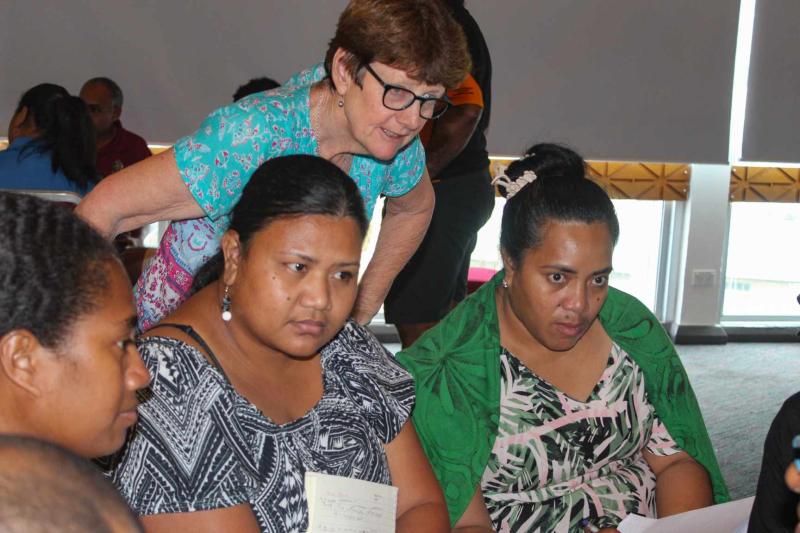
SUVA, FIJI, APRIL 22, 2024– The Pacific region's reliance on its rich marine resources- critical in food security, economic stability, and cultural heritage, makes it imperative that sustainable fishing practices are not just encouraged but strictly enforced, Pacific Islands Forum Fisheries Agency (FFA) Dr Manu Tupou-Roosen says.
Her comments follow the conclusion of a FFA training on Hazard Analysis and Critical Control Point (HACCP) and Prerequisite Programs/Good Hygiene Practices (PRP/GHP), held in partnership with the Pacific-European Union Marine Partnership (PEUMP) Programme, which is supported by the European Union (EU) and the Government of Sweden.
“The HACCP, PRP and GHP measures are the cornerstones of maintaining the safety and quality of fish products, supporting the long-term viability of the Pacific's multimillion-dollar fishing industry,” Dr Tupou-Roosen said. “All fishing vessels must implement the HACCP and PRP/GHP measures, they are not only regulatory requirements but also a commitment to food safety and public health.”
FFA’s training sessions are designed to ensure that all stakeholders are knowledgeable and prepared to uphold the highest standards in the fishing industry.
Patrick Daniel-Ramananarivo, the Head of Climate Change, Environment, Energy and Trade Section at the EU Delegation to the Pacific, highlighted that the PEUMP programme was designed in consultation with Pacific stakeholders and for the benefit of the Pacific community. He also emphasised that establishing competent authorities, a requirement to access EU markets, is essential to ensure consumer protection both locally and around the world.
Competent authorities, which include dedicated officers from Health or Fisheries Departments are responsible for ensuring that fishing companies and vessels adhere to HACCP, PRP and GHP measures, from the moment a fish is caught to when it reaches the consumer's plate.
“Your roles as competent authorities are crucial in contributing to public health policies to make sure that products that are being processed or sold are safe enough to be consumed,” Mr Daniel-Ramananarivo. “Investments in the fisheries sector would be in vain if exporters are not able to access markets because there is no competent authority or certification process in place.”
The two-week training in Suva, Fiji was attended by 16 officers from competent authorities and two industry representatives from nine countries across the Pacific. The training reflects the importance of the subject (HACCP and PRPs) to any establishment and the Competent Authority seeking overseas market access, particularly the EU. HACCP is now a mandatory legislative requirement.
The training encourages both the CA and the Industry to take a critical look at HACCP and operations and to start developing and championing food safety culture. Enforcing a food safety culture and a well thought out, technically correct and realistic HACCP Plan is a company’s blueprint on how to manage the significant hazards that are inherent in almost all food handling and processing operations and specifically in food establishments.
“I've found this training beneficial, particularly in enhancing my technical skills and broadening my understanding of food safety issues and regulations relevant to my work. It has provided me with a fresh perspective and the opportunity to strengthen areas where I need improvement,” shared Martha Paul of the National Fisheries Authority in Lae, Papua New Guinea.
For Kiribati Senior Verification Officer, Joanna Rabaua, this training has arrived at a crucial moment, coinciding with the country's inaugural fish shipment to the European Union market this month.
“The training's focus on practical scenarios has been invaluable, enhancing our understanding and equipping us with effective solutions," Ms Rabaua expressed.
Richard Brigail, Quality Assurance Manager at International Foods Corporation in Papua New Guinea, recommended broader industry participation in this training. "It's crucial for us to engage more industry representatives in this type of training to ensure we understand and comply with competent authorities," Mr Brigail emphasised.
Donny Andrike, a Competent Authority auditor from the Republic of the Marshall Islands, highlighted the significance of the training in the context of the country's preparations to access the EU market. "This training adds valuable preparation as we ready ourselves to enter the EU market," Mr Andrike remarked.
The EUR 45 million PEUMP programme promotes sustainable management and sound ocean governance for food security and economic growth, while addressing climate change resilience and conservation of marine biodiversity. It follows a comprehensive approach, integrating issues related oceanic fisheries, coastal fisheries, community development, marine conservation and capacity building under one single regional action.
ENDS